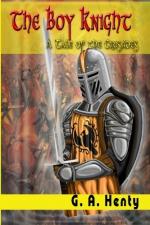At considerable length he explained to Cuthbert the exact position of the Christian army, which had moved some distance along the coast since Cuthbert had left it. It was, he said, exposed to constant attacks by the Saracens, who harassed it in every way, and permitted it no repose. He said that the high hopes which had been raised by the defeat of the Saracens at Azotus had now fallen, and that it was feared the Christians would not be able to force their way forward to Jerusalem. The great portion of their animals had died, and the country was so eaten up by the Saracen hosts that an advance upon Jerusalem without a large baggage train was next to impossible; and indeed if the Christians were to arrive before that city, they could effect nothing without the aid of the heavy machines necessary for battering the walls or effecting an escalade.
Cuthbert was vastly grieved when he heard of the probable failure of the expedition, and he burned with eagerness to take his part again in the dangers and difficulties which beset the Christian army. His host pointed out to him the extreme difficulty and danger of his crossing the enemy’s lines, but at the same time offered to do all in his power to assist him. After two days’ stay at the village, and discussing the pros and cons of all possible plans, it was decided that the best chance lay in a bold effort. The host placed at his disposal one of his horses, together with such clothes as would enable him to ride as an Arab chief of rank and station; a long lance was furnished him, a short and heavy mace, and scimitar; a bag of dates was hung at the saddlebow; and with the sincerest thanks to his protector, and with a promise that should the Christian host win their way to Jerusalem the steed should be returned with ample payment, Cuthbert started on his journey.
CHAPTER XVI.
A fight of heroes.
The horse was a good and spirited one, and when he had once descended to the plains, Cuthbert rode gayly along, exulting in his freedom, and in once again possessing arms to defend himself should it be needed. His appearance was so exactly that of the horsemen who were continually passing and repassing that no observation whatever was attracted by it. Through villages, and even through camps, Cuthbert rode fearlessly, and arrived, without having once been accosted, near the main camp of the Saracens, which extended for miles parallel to the sea. But at a distance of some three leagues beyond could be seen the white tents of the Christian host, and Cuthbert felt that the time of trial was now at hand.




